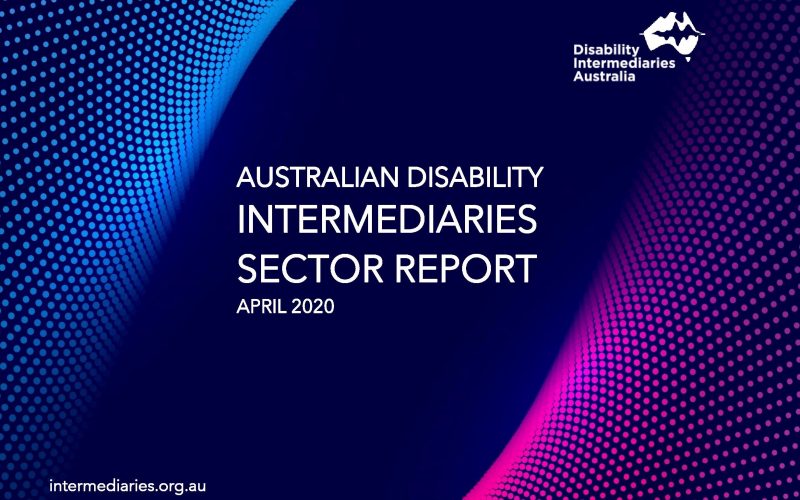Disability Intermediaries Australia first Sector Report highlights the pivotal role of NDIS Plan Management and Support Coordination to the success of the scheme
During the crisis of COVID-19, Plan Management and Support Coordination are the bridge between NDIS plan funding and their use. Both NDIS funded Intermediary supports are revolutionary and innovative, introduced only with the start of the NDIS. People with a disability are an at-risk cohort of the Australian population and are in a similar situation to that of older Australians and nursing homes across the country.
Plan Management is a financial intermediary support delivered by Registered Plan Management Providers (RPMPs) to provide significant benefit to Participants and the NDIS. Plan Management supports are enablers of choice and control, capacity building, self-direction, and improved outcomes for people with a disability. Plan Management facilitates and supports NDIS participants to choose supports and providers from the broader community, as well as registered disability support providers. 120,000 Australians use a RPMP every month – approximately 35% of all NDIS participants.
Support Coordination a service intermediary provided mostly 1:1, assisting participants to understand their plans, find and negotiate with providers and is delivered through three levels of focus and specialisation. Support Coordinators deliver support during crisis events, such as the current COVID-19 pandemic which sees significant threats to people with a disability through compromised health, self and/or provider imposed protective isolation, service closures and in some cases a lack of PPE. Around 130,000 Australians are funded for Support Coordination, approximately 40% of all NDIS Participants.
This inaugural flagship report for the Intermediaries Sector exposes challenges within the operating and policy environment, the data also demonstrates the sector is responding and meeting Participant demand.
Featured in the report are the results from the inaugural Intermediary Sector Survey (ISS). 461 Intermediary service providers responded to this year’s survey. The report also provides expert analysis on the major issues this year. Key findings from the report include:
- Over 108 million dollars has been invested into the Intermediaries Sector, with further investment over the next three years reported to be over 117 million dollars.
- Respondents reported that they employ a total of 24,560 FTE workers across Australia including 1,296 people with a disability and 2,572 carers.
- 84% of Support Coordination and 74% of Plan Management respondents agree or strongly agree that the policy environment is unclear.
- The administrative burden of NDIS systems and processes frustrate providers, with 61% of respondents strongly disagreeing or disagreeing that systems and process in the NDIS are working well.
- On average around 30 hours of Support Coordination is being funded in Participants NDIS plans, with respondents and DIA believing that his should be the minimum and not the average.
- Plan Management respondents reported that on average 95% lodge payment requests with the NDIA within 3 business days of receiving an invoice and 99% disburse funds to providers of support within 3 business days of receiving funds from the NDIA.
On the release of this report,
Mr Jess Harper, DIA CEO said “DIA is at the forefront of Intermediary service thinking and is driving quality and service approaches within the sector to achieve outcomes for people with disability and the National Disability Insurance Scheme (NDIS). Our innovative approach to data and market intelligence ensures that we can enrich and increase the understanding of our sector and how it operates.”
Mrs Julie Keene, Chair of the DIA Board said “For the first time, this sector report provides a detailed view of the operating environment within the Intermediaries sector. DIA continues to highlight the benefits and the practical outcomes that Plan Management and Support Coordination deliver to people with a disability.”
We look forward to working with our members, governments, providers, practitioners, the community and people with disability to ensure Participants can access services and supports that promote choice and control, capacity building, self-direction and informed decision making. For more detail on our survey findings and proposed actions, download the full report below, or for a one-page summary you can share, take a look at the Australian Disability Intermediaries Sector Factsheet below.
 |
 |
Factsheet: Australia Disability Intermediaries Sector Report |
Contact information:
Mr Jess Harper
CEO | Disability Intermediaries Australia
M. 0421 244 824
E. jess.harper@intermediaries.org.au
Further / Background Information
Formed in late 2018, Disability Intermediaries Australia (DIA) is Australia’s peak body for non-government disability intermediary service organisations and practitioners. Collectively, DIA members deliver Support Coordination and Plan Management services to well over 60,000 Australians with all types of disability. DIA as the peak intermediary thought leader believes that now more than ever, it is incredibly important to publish this report which clearly articulates the current state of the Intermediaries market in Australia.
In 2020-21, DIA will:
- Develop sector standards to support continuous improvement and innovation whilst maintaining a base level of quality.
- Work with the NDIA to improve its internal policies and processes, focusing on:
- The Annual Price Review;
- Quantity of minimum funding for Support Coordination;
- Improvements to the NDIA Business System (Portals);
- Implementation of the Digital Partnership Program (DPP) and associated Application Program Interfaces (APIs); and
- Ensuring adequate escalation processes for sector issues and pain points.
- Work with the NDIS Quality and Safeguards Commission to improve Registration, audit and compliance requirements whist promoting and upholding:
- The rights of, and promote the health, safety and wellbeing of, people with disability receiving supports or services under the NDIS.
- Continuous improvement among NDIS providers and the delivery of higher standards of supports and services to people with disability.

